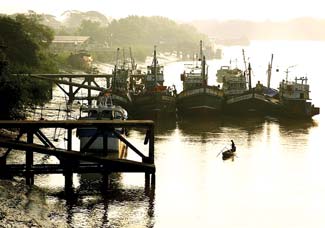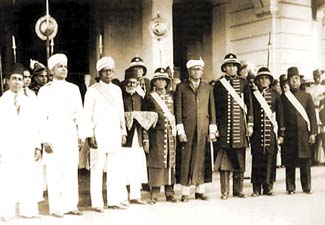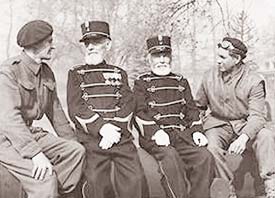|
Looking back:
When colonialism ruled the world
Colonialism - it may seem like any other English word that you
frequently see in print or hear in conversation, but if you take time to
reflect on its meaning, you'll be amazed at the power this simple eleven
letter word holds; it describes an extremely strong force that spread
its tentacles far and wide, like an octopus, to imprison many a nation.
Even our beloved motherland was a victim of this monstrous force until
we gained independence on February 4, 1948.
  With independence celebrations and words such as 'freedom' and
'colony' still fresh in our minds, we thought of enlightening you
briefly about colonialism. With independence celebrations and words such as 'freedom' and
'colony' still fresh in our minds, we thought of enlightening you
briefly about colonialism.
Colonialism basically means the takeover of other countries or lands
by a particular country which is more powerful than the territories
being invaded. Colonising nations generally dominate the resources,
labour and markets of the countries they go into. They also impose
(force to accept) their socio-cultural, religious and linguistic
structures on the indigenous people of the territories they takeover.
This historical phenomena(remarkable occurance) of colonialism stretched
around the globe, and across times, but it was mostly during the 18th
century that the big powers of the world at that time, exhibited this
phenomenon.
Whenever a nation built an empire it went about creating colonies
with two objectives; to get maximum benefit of the import and export of
products and resources, and also as a show of strength. The more
colonies a nation had, the more powerful it became as an empire.
The race for colonies which began around the 16th century became
intense during the 19th century with vast empires being established. In
the late 1800s, Europeans took possession of a large portion of the
world, establishing colonies in North and South America, Australia and
parts of Africa and Asia.
|

Pictures depict colonial rule in different parts of the world. |
This all came about as a result of technological development in
navigation. With more developed navigational systems, more territories
in remote parts of the world got connected. For instance, when Britain
became a leading naval power, it gained control of many weaker nations.
It even defeated other nations such as France and the Dutch Republic in
the race for colonies. By 1914, Great Britain ruled an empire containing
a quarter of the world's population. France governed an area which was
28 times bigger than its own size. United States had colonies in the
Pacific.
In the late 1800s, the United States acquired the Midway Islands in
the Pacific (1867) and annexed Hawaii (1898) too. After the American
victory in the Spanish-American War of 1898, Spain gave back its
colonies of Puerto Rico, Guam and the Philippines to the United States.
The United States had a colonial empire then and became an important
world power.
By 1914 seven European countries had colonies in Africa. They were
France, Great Britain, Italy, Germany, Spain, Portugal and Belgium.
The two countries competing with each other to establish colonies in
the 18th century were France and Great Britain. By 1763, Britain had
gained control and driven the French out of India, Canada and the Ohio
Valley. They also invaded our motherland in 1796 and annexed Sri Lanka
(then known as Ceylon) as a colony. However, it was India that was the
jewel of the British empire.
These conquests of new territories were sometimes peaceful, but more
often they were violent. In fact some of them led to genocide (the
killing of native populations).
The colonisation of new territories were often started by explorers
and missionaries who went into these lands and convinced the natives to
come under the control of their countries.
Colonialism is not a modern phenomena. World history is full of
examples of one society gradually expanding and incorporating the nearby
territories and then settling its people in these newly acquired areas.
The ancient Hitties from Anatolia (present Turkey) conquered most of
Syria, Mesopotamia and Babylon in the 1500 BC. Their empire fell in 1200
BC and the Assyrians from northern Mesopotamia took over. But the
Assyrian empire too fell to the Babylonians in 1609 BC.
So, colonialism in some form or the other comes down from ancient
times. In modern times, the word colonialism is often used as a synonym
for imperialism because both are forms of conquest. It sometimes becomes
difficult to differentiate one from the other.
As we explained earlier, colonisation, which is basically the
extension of a nation's sovereignty over territories beyond its borders,
was not a peaceful effort. It led to many disputes and bloodshed.
So, after World War II, the United Nations which was established to
look into all issues that disturbed world peace, put the brakes to this
practice and all UNO member countries were assured of their sovereignty.
Today colonialism, at least the way the world once knew it, is no
longer in force. A majority of the nations that were once colonies of
the developed countries gained independence. Canada was the first to
become a self-governing territory or dominion in the British empire.
Only a small number of islands are still governed as colonies.
`************
Quick facts:
* The term colony comes from the Latin word clonus meaning farmer.
* The first colonies were established by the Spanish and the
Portuguese in the 15th and 16th centuries in the Western hemisphere.
* The Dutch colonised Indonesia in the 16th century.
* The colonisation of Africa began in the 1880s, and by the 1900s
virtually the entire country was controlled by Europe.
* British settlers colonised Australia and New Zealand.
* The age of modern colonialism began around the 1500s with the
discovery of a sea route around Africa's southern coast in 1488 and of
America in 1492.
* Emerging nations like France, England, Portugal, Spain and the
Dutch Republic were the main contenders.
* Like colonialism, imperialism also involves economic and political
control over a dependent territory. Imperialism comes from the Latin
term imperium meaning to command.
* Brazil was the only country in Latin America to gain independence
without bloodshed.
* The policy and ideology of European colonial expansion between the
1870s and the outbreak of World War I in 1914 are often characterised as
the 'New Imperialism'.
* The Greeks and the Romans both had colonies.
* The Vikings, people from what is now known as Norway, Sweden and
Denmark established colonies in Greenland and New Foundland. But the
settlements failed. However, they were more successful in establishing
colonies in parts of Europe, including northern France, Sicily, England
and Ireland.
* France had colonised most of eastern and central Canada and the
entire basin of the Mississippi and Missouri rivers and the Great Lakes
of USA - American territories east of the Mississippi (in modern USA).
Some of the British colonies are: Aden, Australia, Bahamas, Central
Africa, East Africa, Brunei, Canada, Cape Colony (South Africa), Cook
Islands, Cyprus, India, Ceylon, Hong Kong, Ireland, Jamaica, Kenya,
Maldives, New Zealand and Singapore.
|


